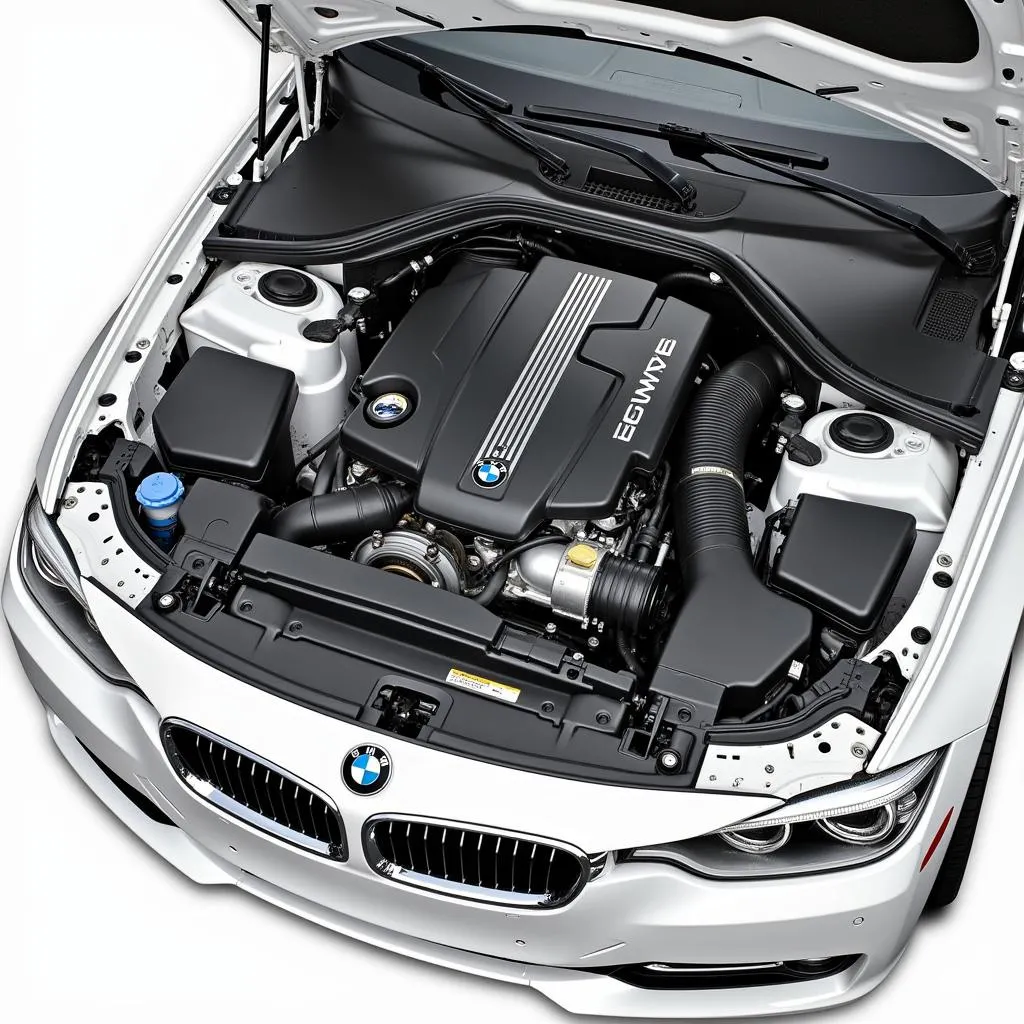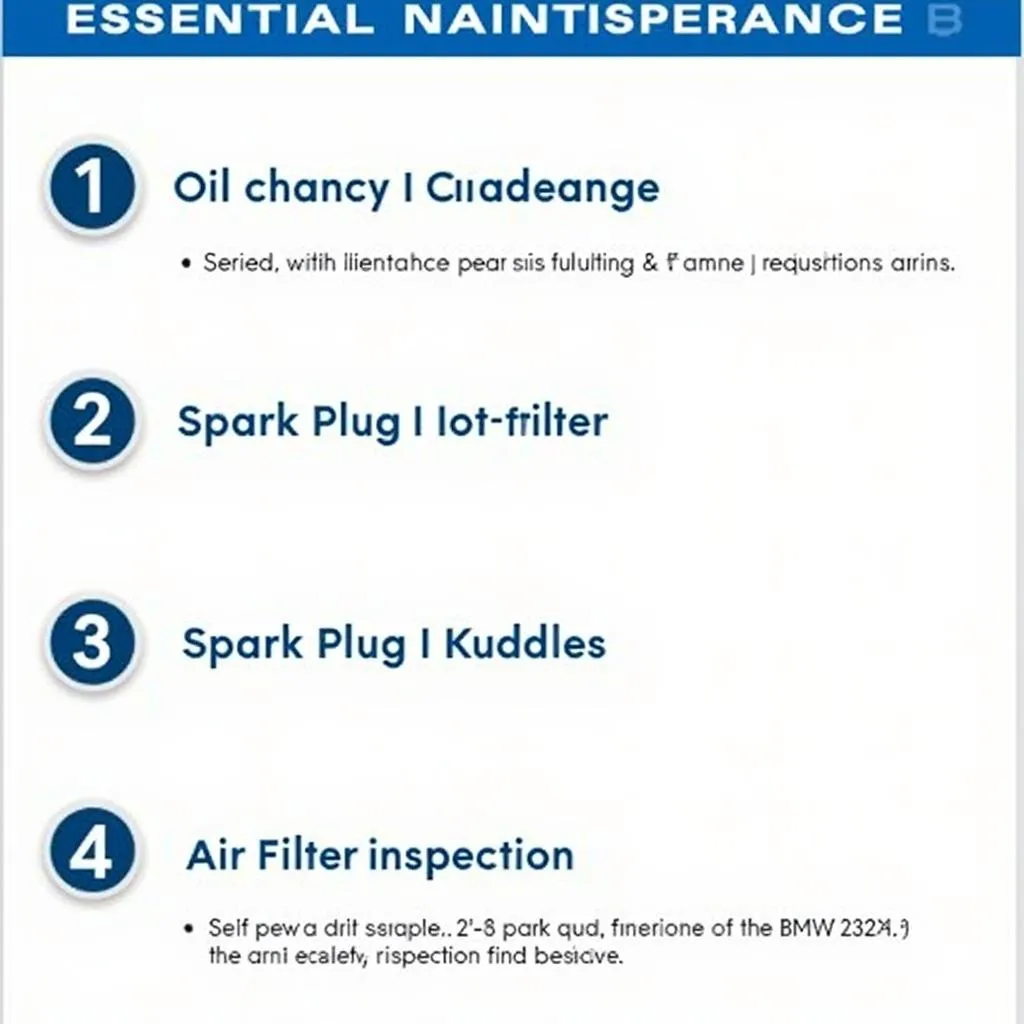BMW 328xi Engine: A Comprehensive Guide
The BMW 328xi is a popular choice for drivers seeking a balance of performance and all-weather capability. At the heart of this dynamic machine lies the Bmw 328xi Engine, a marvel of German engineering renowned for its power, efficiency, and refinement. In this comprehensive guide, we’ll delve deep into the intricacies of this engine, exploring its specifications, variations, common issues, maintenance tips, and more.
 BMW 328xi Engine Bay
BMW 328xi Engine Bay
Decoding the BMW 328xi Engine: Specifications and Variations
The BMW 328xi engine, depending on the model year, typically refers to one of two impressive engines:
- N52 (2007-2011): This naturally aspirated inline-six cylinder engine boasts a displacement of 3.0 liters and utilizes BMW’s Valvetronic and Double VANOS technology. It produces around 230 horsepower and 200 lb-ft of torque.
- N20 (2012-2016): This turbocharged four-cylinder engine, also with a 2.0 liter displacement, marked a shift towards smaller, more fuel-efficient engines. Despite its size, it packs a punch, delivering approximately 240 horsepower and 260 lb-ft of torque.
Both engine variations are lauded for their smooth power delivery and responsiveness, making the 328xi a joy to drive in various conditions.
What Makes the BMW 328xi Engine Stand Out?
Several key features contribute to the BMW 328xi engine’s reputation for performance and efficiency:
- Valvetronic (N52): This variable valve lift system optimizes valve opening durations, improving both power output and fuel economy.
- Double VANOS (N52): Continuously adjusting the timing of both the intake and exhaust camshafts, this technology enhances engine performance across the entire rev range.
- TwinPower Turbo (N20): This twin-scroll turbocharger technology minimizes turbo lag, providing instant power delivery even at low engine speeds.
- High-Pressure Direct Injection: Both engines utilize high-pressure direct injection, precisely delivering fuel directly into the combustion chamber for improved combustion efficiency and fuel economy.
These innovations, combined with BMW’s dedication to precision engineering, result in an engine that’s both powerful and refined.
Common Issues with the BMW 328xi Engine
While the BMW 328xi engine is generally known for its reliability, like any complex machine, it can experience issues over time. Some common problems include:
- Valve Cover Gasket Leaks (N52): Over time, the valve cover gasket can become brittle and leak oil, potentially leading to burning smells and reduced engine performance.
- High-Pressure Fuel Pump Failure (N20): In some cases, the high-pressure fuel pump can fail, leading to hard starts, engine misfires, and reduced power.
- Timing Chain Issues (N20): While less common, timing chain issues have been reported in some N20 engines, potentially resulting in catastrophic engine damage if not addressed promptly.
 BMW 328xi Engine Maintenance
BMW 328xi Engine Maintenance
Maintaining Your BMW 328xi Engine: Tips for Longevity
Proper maintenance is crucial to extending the lifespan of your BMW 328xi engine. Here are some key tips:
- Regular Oil Changes: Adhering to the manufacturer’s recommended oil change intervals is paramount. Using high-quality synthetic oil can further enhance engine protection.
- Cooling System Maintenance: Ensure the cooling system is functioning optimally to prevent overheating. This includes regular coolant flushes and inspections of the radiator and water pump.
- Spark Plug Replacement: Regularly replacing spark plugs, especially in the N20 engine, can help prevent misfires and improve performance.
- Air Filter Inspections: Inspect and replace the air filter as needed to ensure optimal airflow to the engine, enhancing combustion efficiency.
Unlocking Peak Performance: Tuning and Modifications
For enthusiasts seeking to enhance the performance of their BMW 328xi engine, various tuning and modification options are available.
- ECU Tuning: Reprogramming the engine control unit (ECU) can optimize fuel delivery, ignition timing, and boost pressure (N20), resulting in increased horsepower and torque.
- Performance Intake and Exhaust Systems: Upgrading to a less restrictive intake and exhaust system can improve airflow, further enhancing engine output.
- Upgraded Intercooler (N20): Installing a larger, more efficient intercooler can lower intake air temperatures, leading to denser air charge and increased power potential in turbocharged engines.
It’s crucial to consult with reputable tuners and mechanics experienced with BMWs before undertaking any modifications to ensure compatibility and avoid potential damage.
Choosing the Right BMW 328xi: Factors to Consider
When deciding on a BMW 328xi, consider these factors:
- Model Year: Determine if the naturally aspirated N52 (2007-2011) or turbocharged N20 (2012-2016) engine better suits your driving preferences and needs.
- Vehicle History: Obtain a pre-purchase inspection from a qualified BMW mechanic to assess the condition of the engine and identify any potential issues.
- Maintenance Records: Review maintenance records to gauge how well the engine has been cared for and if any major services are due.
Conclusion: The BMW 328xi Engine – A Blend of Power and Refinement
The BMW 328xi engine exemplifies German engineering at its finest, delivering a compelling combination of performance, efficiency, and refinement. By understanding its nuances, adhering to recommended maintenance, and exploring performance enhancement options, drivers can fully appreciate and enjoy the capabilities of this exceptional engine.
Looking for a great deal on a used BMW 328xi? Check out our selection of 2011 bmw 328xi for sale.
FAQ: Your BMW 328xi Engine Questions Answered
- Q: What is the typical lifespan of a BMW 328xi engine?
- A: With proper maintenance, these engines can often last well over 200,000 miles.
- Q: How often should I change the oil in my BMW 328xi?
- A: Follow the manufacturer’s recommendations, typically every 5,000-7,500 miles depending on driving conditions and oil type.
- Q: What type of fuel is recommended for the BMW 328xi engine?
- A: Premium unleaded gasoline with an octane rating of 91 or higher is recommended for optimal performance and engine longevity.
Need help finding the right bmw oem amplifier 2008 328xi? We can help!
Experiencing Engine Issues? We Can Help!
At Car Diag Xpert, our team of certified technicians specializes in diagnosing and repairing BMW engines. Contact us today at +1(641)206-8880 or email us at [email protected]. Our shop is conveniently located at 276 Reock St, City of Orange, NJ 07050, United States. We’re here to provide expert assistance and keep your BMW running smoothly.
For more information on BMW vehicles and maintenance, check out our other articles, including insights on Peterson BMW cars and the classic 1971 bmw 75 5.
If you’re experiencing issues with your 2008 bmw 328xi transfer case, we have a dedicated team that can help.
